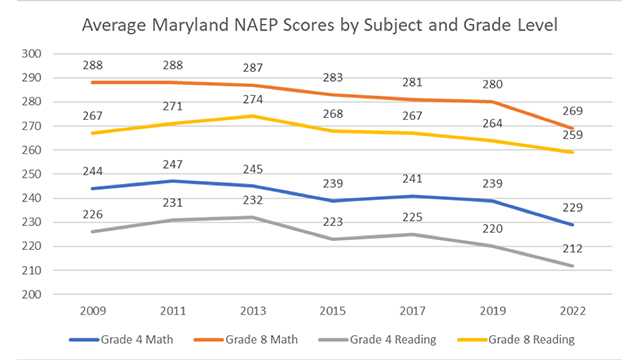
The latest National Assessment of Education Progress (also known as the “Nation’s Report Card”) report confirms what most educators and parents already knew: The achievement levels of students in Maryland and around the U.S. have shown steady declines since 2013. This is no surprise. According to The Brookings Institution, Pew Research, and others, most of the measures of overall welfare and stability are also declining. Families are fragile. Income growth is declining. People feel less safe. People believe that there are caps placed upon their potential. More people report feeling hopeless about their futures.

These effects are most evident in Black households, and Black boys show some of the steepest declines in academic achievement, although the girls seem to have been most directly impacted by the isolation of Co-vid. Again, no surprise.
Here's the reality:
Black kids are no less bright than White, Asian, and Hispanic kids. In fact, they are constantly demonstrating how brilliantly resilient they are despite the odds. But currently, their academic needs are not being met.
Any viable learning solutions for these kids must consider social context and culture. Have we seriously asked how seeing unarmed Black men (and women) being gunned down, about inner city drinking water being tainted, about the many new illnesses that are plaguing us -- did we pause to think about how that trauma is affecting our children? Or did we expect them to be immune to the toxicity that surrounds them?
The educational goals we develop for our children must be rooted in feasibility, sustainability, measurability, and the reality of our current culture. Our focus over the last three decades has been on measureability. If we cannot measure it, it isn't important. But many factors that affect achievement are not easily measured. External factors like pandemics, wars, and poverty will negatively affect educational outcomes unless those factors are aggressively mitigated.
We have collectively not done a good job of anticipating how these negative effects will manifest themselves. Instead, we seem to be rehashing old ideas and training teachers with old methodologies. We seem to not understand the importance of caretaker involvement in the learning process or the need for cultural responsiveness in teaching practices. We are not offering high-schoolers learning options that synch with their dreams and goals. We are stuck in the past.
Literacy and numeracy have to become priorities for all people in a community and not just for the children. If reading and learning are not important to adults, the children will almost always reflect that.
It is time for a fresh approach that is holistic in nature, one that cannot disregard the effects of the milieu on student achievement. It must help strengthen and give hope to the families. Then we might actually see improvements in achievement.
This article is republished with permission from the author. It was posted as a personal Facebook blog on October 25, 2022.
Candice “Sister Islaah” Abd’al-Rahim reverted to Islam in 1976 and considers herself a student of knowledge. She has deep education credentials which include a M.A. in Teaching, Certificate of Advanced Studies (Post-Masters) in Administration and Supervision, B.S. in English, and experiences as a principal (in fact the first hijab public school principal in Maryland!), curriculum and staff developer, mentor, and classroom teacher of grades pre-K through 12. She is a former adjunct professor at Johns Hopkins University’s Graduate School of Education and is a doctoral candidate in Islamic Sciences at the International Online University. Islaah’s contributions to the field have earned her honors in the Who’s Who of Distinguished JHU Alumni. She is wife, daughter, mother, and grandmother and is an active member of several Muslim communities in the Baltimore area.



Add new comment